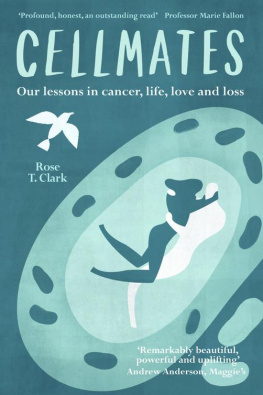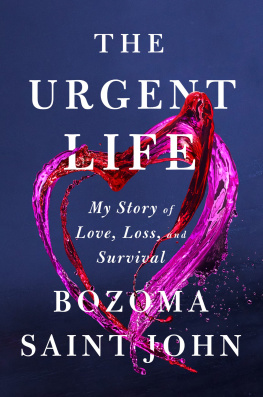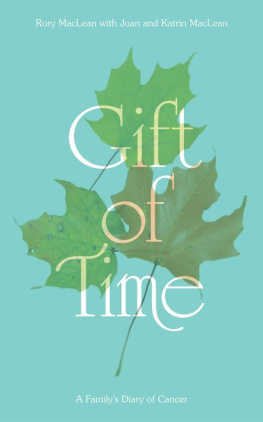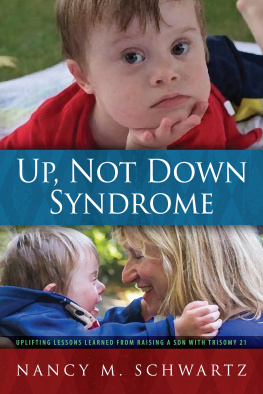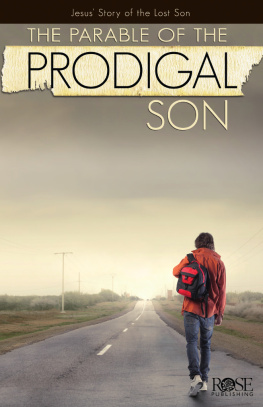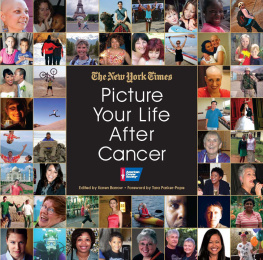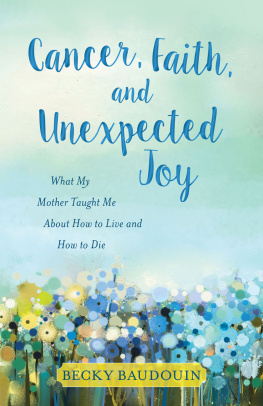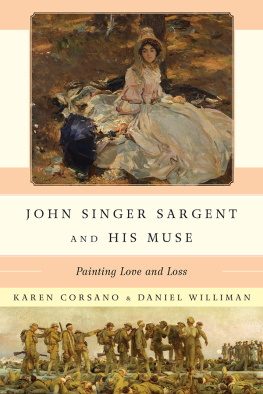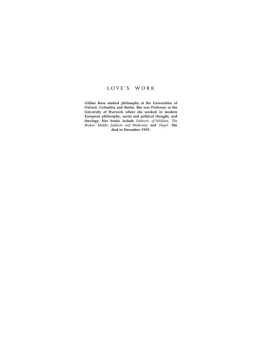A beautifully written testimony to the human spirit and its capacity when stretched to its limits Should be on the reading list for all those involved in cancer care. Dr Elspeth Salter, Centre Head, Clinical Psychologist, Maggies Fife
Excellent reading for health care professionals, medical and nursing students and anyone touched by cancer. Professor Marie Fallon, St Columbas Hospice Chair of Palliative Medicine, University of Edinburgh
A remarkably beautiful and powerful account [that] will be of great help to others dealing with the ongoing challenges of cancer care. Andy Anderson, Maggies Edinburgh, Centre Head
[Clark] lights a fire at the heart of the story, a flame of human warmth that keeps burning however harrowing the events become. Jamie Jauncey, author
Reading the book has helped reinforce some of the reasons why doctors such as myself do the job it can make a difference to peoples lives. Duncan McLaren, oncologist
A searingly honest, compelling account [which] makes valuable, and sometimes difficult, reading for doctors about what really matters to people facing such a challenge The unrelenting progression of the disease and the intensity of the suffering may engender unease and apprehension in the reader. The couples response to it engenders, more strongly, respect and admiration for the human spirit. Dr. Lesley Morrison
The following reviews were written by Macmillan Cancer Supports Cancer Voices. They are not the views of Macmillan Cancer Support.
This is a very powerful book, beautifully written from the heart. Prostate cancer patient
Compelling and articulate offers a powerful insight into the range of emotions experienced and some strategies for protection and self-preservation. It will help those with cancer and [their carers ] by offering a connection with others who have been through the experience [and] a toolbox of ideas for those currently on their cancer journey. I recommend this book across the board. Cancer survivor, former oncology nurse
A truly inspirational read and very useful, particularly for carers, friends and relatives It is a pleasure to read and incredibly difficult to put down! This has to be added to my list of best books ever read. Absolute top marks for this amazing book. Breast cancer patient
This account is not appropriate for every stage of cancer [but] if you have no illusions, it might dramatically improve your strategy and confidence; it is rich in advice, humour, hope, strategy and love It is a fantastic example of learning through experience and using this learning to help others. Breast cancer survivor
Deals frankly with many issues, including end of life. It is most useful for carers and should be read by cancer health professionals . I suggest that patients wait until after treatment to read it. Survivor of leukaemia
I read it in two days and wish I had read it 10 years ago. Living with breast cancer & relative of bladder cancer patient
Excellent in helping the reader feel that they are not alone with the cancer nightmare If you are not a fluffy, pink-ribbon person and need a more down-to-earth approach, this book provides an excellent, truthful approach [but] it is at times harrowing. Living with breast cancer
To me its ironic that the smallest unit of life within us, the clever building blocks that allow us to be healthy human beings, can alter and divide out of control into an inhumane threat to any one of us at any time. They are the Jekyll and Hyde of our physiology.
For the many people who dedicate their time to caring for others. It is not until you are in the hands of your knowledge and instincts that you realise the enormity of what you do. With your help John and I were able to live in times of true happiness. We remember you and thank you for making a difference each day.
Duncan McLaren
Marie Fallon
Claire Hunter, Elliot Longworth, Joan Scott, Tara Mulube and all the staff at Johns local medical practice
Elspeth Salter, Andy Anderson and all the staff at Maggies Edinburgh
John MacFarlane
The nurses and doctors from the first floor Marie Curie Hospice Fairmilehead, Edinburgh
The nurses, doctors and consultants at the Western General Hospital Oncology Wards and Chemotherapy Day Unit
The district nurses, Marie Curie nurses especially Eleanor and those from the Nursing Guild who sensitively helped care for John in our home
Macmillan Cancer Care
The nurses, physiotherapists and consultants at the Edinburgh Royal Infirmary
cell [biology]
The smallest structural and functional unit of an organism
Oxford English Dictionary
cancer [mass noun]
A disease caused by an uncontrolled division of abnormal cells into part of the body
Oxford English Dictionary
please note
The author wrote this powerful personal account primarily to raise awareness of critical issues relating to cancer care. The intended audiences are medical professionals and policymakers, but it may also be appropriate for some patients in palliative care and their carers, as well as those recently bereaved. The language is sometimes graphic and the sections covering pain management may be disturbing, particularly to recently diagnosed patients or those with a recurrence of their disease.
If you are a patient or carer, please seek appropriate advice and resources to help you at your particular stage of diagnosis and treatment. Organisations dedicated to helping you through cancer and bereavement are listed at the back of this book.
Professor Marie Fallon
St Columbas Hospice Chair of Palliative Medicine,
Edinburgh Cancer Centre and University of Edinburgh
Although I see patients with incurable illness every day and I like to think I understand a lot about what people endure, I was surprised by the impact of Roses story. This is a beautifully written book. It is firstly the story of two people who love each other and the journey, at times tumultuous, of that love story. Alongside this very personal, honest and touching account of their love is the struggle with cancer and all that it encompasses for both John, as patient, and Rose, as partner and carer.
This is an account of hope, despair, highs, lows and, of course, challenges with the health care system and at times with individuals within that system. The account of all these aspects is told in a very integrated and human way; nothing is in isolation, rather it is part of a bigger picture which is both very personal and very honest. For these reasons I think this is an outstanding read for all health care professionals, both postgraduate and undergraduate. We talk about integrated care but rarely about integrated outcomes . Rose gives a very vivid account, which is multifaceted and multidimensional, of two very real people. It is a picture that no professional could ever build from reading a textbook or even an in-depth discussion at consultation.
However, this story, which at times can be happy, warm and comforting, and at other times distressing, is more than anything a beautifully crafted, sensitively told and startlingly honest account of the lives of two people. The general reader will find they cannot put it down.

